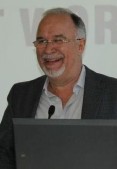Frank Richardson, United Kingdom
Project: “Fair Trial Smartphone Apps”
Mr. Frank Richardson obtained his degree in Quantitative Social Studies from the University of Kent. He attended the College of Law and studied Intimate Knowledge of Legal System Dysfunction in Indonesia. This foundation has contributed significantly to his work as a very successful entrepreneur in the field of education in Indonesia.
Mr. Richardson currently works at OpenTrial. OpenTrial strives to ensure legal systems deliver justice by harnessing modern technology to enhance transparency and accountability in order to reduce the scope for corruption, violence and political influence in legal processes. The JusticeMakers program is delighted to have his commitment to strengthen justice systems.
The Project: Development of a Smartphone application that educates citizens, public officials and lawyers about their legal rights. Furthermore, the technology sought to help implement legal rights in practice and publicly report violations, as public exposure is the most effective deterrent to legal system abuse. This type of interactive information sharing increases transparency levels and accountability and has the potential to have an enormous impact on broadening access to justice and, thus, curbing torture, and corruption.
Results: Unfortunately, the two organisations in Paraguay – Semillas para la Democracia (Seeds of Democracy) and Fundación Proley-Justicia Para Todos (Foundation Proley-Justice For All) – that Mr. Richardson intended to cooperate with could not proceed because of national political reasons and budgetary issues. While Paraguay still is in his sights in the longer term, he focused instead on finding an alternative partner.
However there was progress on other fronts:
In May 2015, Mr. Richardson met Tawanda Hondora, PhD, Director – interim, Law and Policy Programme and Caroline Stomberg, Head of Publishing (Global Content Programme), Campaigns and Communications Directorate at Amnesty International.
They concluded that the proposal had much to commend it and that Amnesty International was interested, as an organisation, in the use of apps, among different technologies and platforms, for (i) the dissemination and distribution of the content of their work, targeting different and diverse constituencies; (ii) activism; and (iii) fundraising. However, on this occasion, they felt the benefits and considerations were outweighed by their view that, for the app project to be a success, it would require the investment of resources that Amnesty International is currently unable to commit. But the meeting was very useful in that they did introduce Mr. Richardson to organisations that promote due process on the ground in specific countries and which might consider working with OpenTrial.
On December 3rd and 4th, 2015, he attended the Innovating Justice Forum an initiative of the Hague Institute for the Internationalisation of Law (HiiL) – Innovating Justice, the Ford Foundation, and the Global Agenda Council on Justice of the World Economic Forum. It offered good networking opportunities and he met many new and useful contacts including Anna Gouwenberg, Head of Office of the Knowledge Platform Security & Rule of Law and Willem van Nieuwkerk, Director of The Centre for International Legal Cooperation. He also met the program coordinator of International Development Law Organisation, Daniella Andela and Indonesia Rule of Law Programme Programme Manager of Strategic Initiatives, Helen Molinier.
Amnesty International and Anneke Meerkotter, Litigation Director of the Southern Africa Litigation Centre, an alternative partner (and country) has been found. The Centre for Human Rights Education and Assistance (CHREAA) in Malawi promotes and protects human rights by assisting the vulnerable and marginalised people in Malawi to access justice through civic education, advocacy and assistance.
As a result of his search for a partner for this project, organisations in Kenya, Indonesia, Chile and Paraguay have expressed at the strong desire to work as partners on post-pilot projects (for which we will aim for financial sustainability); these include branches of Transparency International. Others in countries such as Myanmar, India and Zimbabwe have also expressed an interest.
Phase 2 of pilot project:
This involves researching and loading due process legislation, constitutional article information and a carefully compiled checklist onto the app template; thoroughly checking the now upgraded app and then launching it in Malawi, where CHREAA will actively promote the app, enrol users and report back. It is essential the text for the app is accurate (with regard to current legislation and constitutional law), easy for the layperson to comprehend and is in both in good Chichewa and English.
